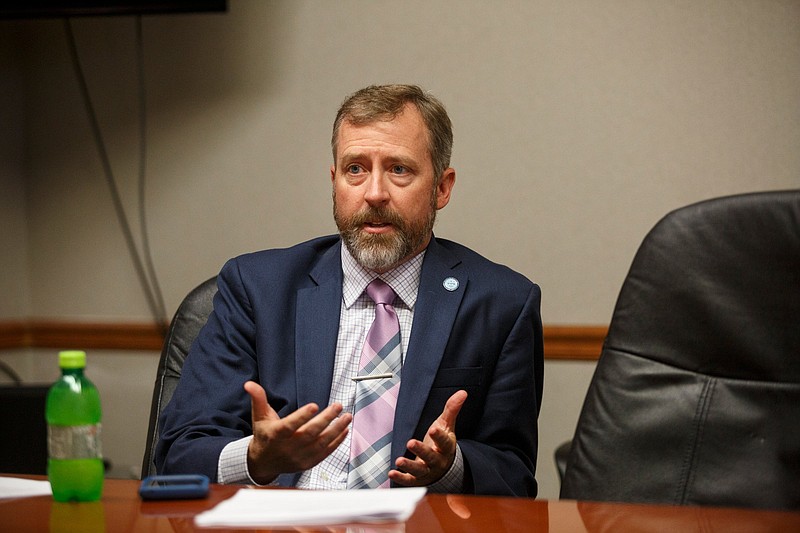NASHVILLE - The embattled Hamilton County Water and Wastewater Treatment Authority lost its executive director this week as Mark Harrison stepped down.
WWTA's chief engineer, Mike Patrick, has been named in the interim as acting executive director as the authority seeks a replacement for Harrison.
Patrick came to WWTA last year. Prior to that, he worked as director of Chattanooga's Waste Resources Division, where he was responsible for the overall operation of the city's Regional Wastewater Collection and Treatment system.
Friday's announcement of Harrison's departure follows months of controversy in the Ooltewah area, where WWTA proposed to build a new sewage treatment plant off Mahan Gap Road.
Critics attacked the plan and the Hamilton County Commission, which had final say over the matter, voted against the authority's request in December. But WWTA has contended that without new sewers, growth in the county will be stopped or significantly slowed.
It's just one of the challenges faced by the authority, which is expected soon to enter into a federal consent decree with the U.S. Environmental Protection Agency while also grappling with rapid growth in eastern Hamilton County.
"Being the executive director of the Hamilton County Water and Wastewater Treatment Authority is extremely stressful as daily challenges are addressed along with long-term concerns that will shape the growth of Hamilton County for generations to come," WWTA Board Chairman Mike Moon said in a statement Friday. "Mark is to be commended for his dedication to the organization and the county as a whole. We are grateful for his leadership and look forward to the future."
A WWTA board member who wished not to be identified because the full board had not met yet to discuss the resignation, told the Times Free Press that Harrison resigned Thursday night.
"Mark has a great engineering mind," he said. "I think he was just weary of the fight, trying to do the right thing and not seeing the progress he knows we need to make."
WWTA will continue moving forward with all of its projects, serving its customers and working with the EPA, he said.
Moon agreed, saying, "We will continue with the momentum we gained under Mark's leadership. We have an upcoming meeting with the EPA and intend to have continued meaningful dialogue with members of the Hamilton County Commission and community stakeholders as a future for infrastructure and economic development is determined."
In a later interview, Moon said "it was difficult to retain someone" given a number of swirling controversies.
"I completely understand Mark and all the pressure and all the negative public and character assassination he was under," he added.
Moon said while WWTA leaders are sorry to see Harrison go, Patrick will do a good job.
Harrison first served as the WWTA's chief engineer for about two years and, most recently, served as executive director for more than two and a half years.
He is credited with successfully guiding the organization through a state law pushed by local legislators that sought to dissolve the sewer authority. Proponents said the county would be better off if WWTA voted to sell itself to a private company. But it put WWTA in an untenable position and the law was repealed in 2017 because it blocked the authority's access to state loans necessary to maintain and expand its system.
Rep. Mike Carter, R-Ooltewah, who sponsored the law, said he didn't know why Harrison stepped down. "But I supported him in obtaining the position, and he's one of the nicest and genuinely good people I've ever met.
"While I've certainly questioned WWTA's decisions of late, I've never questioned [Harrison's] competence or integrity," Carter added.
Carter previously told the Times Free Press in January he planned to talk with other Hamilton County lawmakers soon "to discuss with them possible help and solutions to the problem, if there is a role for us to play" on the authority's future direction.
"I'm 100 percent in favor of a facility, but 100 percent not in favor of it being located among the communities on Mahan Gap, and in the name of building new neighborhoods, destroying neighborhoods that now exist," he said at the time.
The authority originally considered locating a sewage treatment center in Birchwood. But officials also looked at other sites, saying they settled on Ooltewah due to the topography of the site and costs for construction there. The Ooltewah site's costs have been projected at $45 million to $48 million. That section of the county has been exploding with growth.
Carter, who formerly served as the authority's attorney in its early years when the agency dealt solely with unincorporated areas of the county, also hasn't been happy the authority has been planning to spend $200 million on fixing what it has rather than expanding the system.
Because of WWTA's sewage overflows, the state has imposed a moratorium on new sewer connections in the Ooltewah area. That, in turn, has led to complaints by developers and homebuilders.
Sen. Todd Gardenhire, R-Chattanooga, and Rep. Patsy Hazlewood, R-Signal Mountain, recently introduced legislation to allow homes under or planned for construction to use septic tanks in the meantime. But that's raised concerns from the state as well as environmental groups.
Contact staff writer Andy Sher at asher@timesfreepress.com or 615-255-0550.
